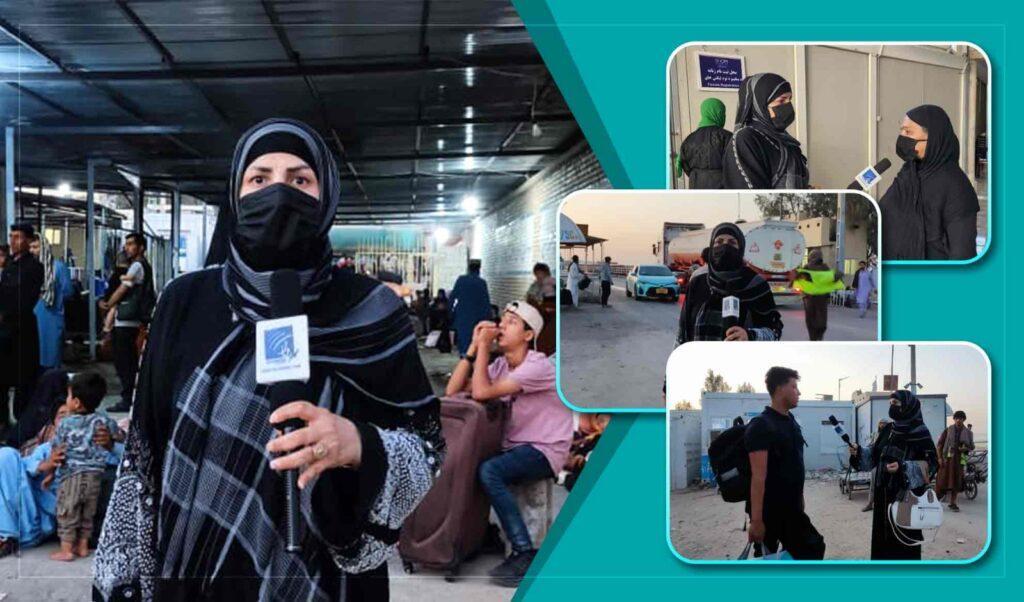
Returnees In Nimroz Face Hardship, Trauma, Seek Shelter
ZARANJ (Pajhwok): Some Afghan migrants who have returned from Iran to Zaranj, the capital of southwestern Nimroz province, are struggling not only with poverty and homelessness but also with deep psychological trauma.
They are calling on the Islamic Emirate of Afghanistan (IEA) and aid agencies to provide more assistance, shelter, and job opportunities.
According to the Ministry of Refugees and Repatriations, more than 1.6 million migrants have returned to Afghanistan from Iran, Pakistan, and Turkey over the past five months.
Four decades of war and insecurity, unemployment, and economic hardship have been the main drivers of migration for millions of Afghans to neighboring, European, and Western countries.
Most Afghan migrants - particularly those in Pakistan, Iran, and Turkey - say they have faced serious challenges in finding decent jobs, adapting to new languages and cultures, and accessing education and healthcare services.
Mehnaz's trauma: Life after her husband's death in migration
Mehnaz, a 40-year-old woman deported from Iran through the Silk Border crossing after four years of living there with her four children, still cannot forget the moment her husband died - a man who lost his life from heat and psychological stress in a migrant camp in Zahedan, leaving Mehnaz alone with poverty, trauma, and four children.
Currently staying temporarily with her relatives in Zaranj, Mehnaz said:“It is very painful that my young husband died before my eyes. With his death, he left me and my four children alone forever.”
Mehnaz and her family left Parwan province for Iran four years ago. Her husband had previously worked for a service organization in Parwan but lost his job after the fall of the former government and was forced to migrate.
According to Mehnaz, her husband worked in a steel factory in Iran, and for a while, their life improved.
However, this summer, the unbearable heat and difficult living conditions in the Zahedan camp ended in tragedy.
“It was around 50 degrees that day,” she recalled.“My husband fainted from heat and stress in the camp and never came back.”
Crying as she spoke, she added:“At night I dream that he dies again. I wake up terrified. I've lost hope in life. Now it's just me and my four children - I don't know how to survive.”
Mehnaz said she had sought help from a mental health counselor but had not seen any improvement.
“I can't stand noise. When the children play, I get irritated... I'm afraid I might hurt them,” she said softly.
Now in Nimroz, Mehnaz plans to return to her home province of Parwan or possibly to Kabul.
“I brought nothing with me. I don't know where to go or what will happen to my children without their father. I wish we had never gone to Iran. Migration cost me dearly - I lost my husband, my children missed school, and despite all our hard work, we gained nothing.”
She hopes to find employment so she can live with dignity and raise her children.
Forced back from Iran: A teenager and family in need
Hamidullah, a 17-year-old boy who is the only breadwinner for his four-member family, returned empty-handed from Iran.
“Unemployment, poverty, and hardship are destroying my spirit,” he said.
Two years ago, Hamidullah migrated to Iran because of economic problems and poverty. There, he worked at a construction site and earned 15 million tomans per month, sending all his earnings to support his family.
Visibly emotional and struggling to speak, he added:“It's been a month since I came back. I've knocked on every door. Every day I go out at eight in the morning looking for work and return at ten at night - but there's nothing. Life is hard. We live in a rented house, and I'm worried about what to do.”
Hamidullah's father died in an accident five years ago, leaving him responsible for the family. He believes unemployment is the main reason most Afghans migrate and has urged the IEA to create job opportunities for returnee migrants.
Sabri's hardship: Life after deportation from Iran
Sabri, a widowed woman deported from Iran along with her three daughters and one son, now battles poverty and homelessness in Zaranj.
She said that several years ago, she and her family migrated to Iran, where her son worked as a laborer and they lived relatively comfortably. But two months ago, they were deported. For one month, they stayed with relatives, and later, a kind person provided them with a small house, allowing them to use just one room.
“In Iran, electricity and water were cheap,” Sabri said.“Since coming here, we have to buy fresh and salty water separately. We have no gas for cooking, so we burn plastic. The smoke blinds me, makes it hard to breathe, and the food smells of smoke. Life here is unbearable. The cash aid from the Emirate is already gone. I clean people's houses so my children won't go hungry.”
With winter approaching, Sabri said she is deeply worried about how she will keep her family warm. She urged the IEA and humanitarian organizations to provide food and fuel to returnee families before the cold season begins.
Maulvi Abdullah Riaz, head of the Department of Refugees and Repatriations in Nimroz province, said that in addition to cash assistance for returnee migrants, plans are underway to establish a residential township for them in the Siyadak area of Zaranj city.
He added that free transportation is being provided to help returnees travel from Nimroz to their home provinces.
At the temporary camp near the Silk Border, food and medical services are available, and in coordination with partner organizations, hygiene kits, household essentials, and food packages for children are also being distributed.
sa

Legal Disclaimer:
MENAFN provides the
information “as is” without warranty of any kind. We do not accept
any responsibility or liability for the accuracy, content, images,
videos, licenses, completeness, legality, or reliability of the information
contained in this article. If you have any complaints or copyright
issues related to this article, kindly contact the provider above.

















Comments
No comment